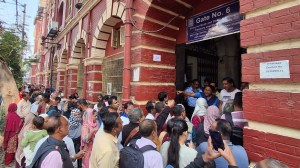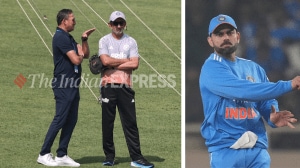Pitting blame wholly and squarely on IPL 2016 for drought is unfair
The IPL is a big target, and because of its fat belly, a soft one. It attracts disdain and envy. What makes it worse is that it absorbs all and keeps smiling.
 Bombay High Court ordered all IPL matches after April 30 to be shifted from drought affected Maharashtra. (Source: PTI)
Bombay High Court ordered all IPL matches after April 30 to be shifted from drought affected Maharashtra. (Source: PTI)
The Bombay High Court ruling, to move the Indian Premier League (IPL) matches out of Maharashtra can be seen in two ways. (Fixtures | Squads)
At best, it massages some egos and serves little other purpose. At worst, the authorities missed a golden opportunity to milk more out of the Board of Control for Cricket in India (BCCI) and the team owners.
There is no doubt that holding the IPL in a region where people are suffering so much, is not a palatable prospect, made even worse by the arrogance of the BCCI in thinking that they are impervious to what afflicts the country.
READ: Bombay HC tells BCCI no IPL in Maharashtra in May
That said, this decision is tantamount to saying that the IPL is the reason for the drought in the region and it should pay, in money, water and logistics, for the sin.
But whose sin is it, to start with?
Noted economist Surjit Bhalla, in a conversation with Karan Thapar on a television channel, was vehement when he said that he’d exhort the IPL not to pay even one paisa for the cause. Bhalla’s contention is that the State administration, which extracts taxes from all in the state, including the IPL is squarely to blame for the brought becoming the monster that it has.
Fair point.
Quite frankly, apart from offensive nature of celebrating the IPL in such sombre situations apart, in real terms it isn’t the IPL’s, or BCCI’s, responsibility to alleviate the miseries surrounding them.
WATCH: The implications of shifting the IPL from Maharashtra (app users click here)
That however doesn’t take away from the blasé entity that BCCI is. This organisation, which has been under so much pressure and on the anvil for repeated legal hammers, just asks for more and carries on shamelessly.
Had they offered to re-jig the IPL, maybe offer relief as part of the package, or had the foresight to stay away from the affected areas, things may have been different. But no. The IPL and its various entities think they’re on a cloud, above and beyond the common lot. Which also gives the administration a perfect escape plan.
The crop cycle in the region is quite a trap. The sugar mills are a lucrative outlet for the local farmers, who get great prices for their sugarcane crops. On the flip side, sugarcane draws more water than many crops. If my information is accurate, one hectare of sugarcane crop needs 2000 litres of water a year!
There is another interesting stat. It is understood that the water shortfall in the region has now climbed close to 23 trillion litres. Stopping the matches in Mumbai, Pune and Nagpur will save about 63 lakh litres. It’s not even a speck. Have any of these people who are objecting to the IPL considered how much water is used to irrigate the Cricket Club of India grounds, Wankhede, even the Gymkhana grounds in Mumbai, the cricket ground in Jamtha or the one in Pune, not to mention the racetracks, football pitches and golf courses in the region, on a normal, non-IPL day?
For that matter, how much water is deployed to wash Raj Bhavan, or the High Court?
But none of them is as high-profile as the IPL. Nor do they provide as effective an escape plan for the State government. There is another factor that wasn’t considered. That the IPL could actually do more if they stayed in the state. The Honourable High Court could have asked them to provide ‘X’ amount of funds for every game, towards drought relief.
Many of the principles involved have effective wherewithal to provide money and technical expertise to provide some relief. There are companies that have pipelines, deep drilling capabilities, even the power to get long tanker trains to come into the region and do their bit. Granted, this could all have been done voluntarily, but failing that, surely the powers that be have the bandwidth to make them do things.
Or you could even shut down the entire IPL. Now, that would really be something.
The BCCI’s general approach to the whole issue reflects the sad mental make-up of all the Indian political parties to current and urgent needs in the country.
For an organisation that boasts of representatives from practically every party in India, it is rather painful to realise that they are almost completely involved in their immediate well-being and prosperity. Even after the High Court ruling, IPL Chairman Rajeev Shukla’s biggest concern was the logistics. A little concern for the human tragedy would not have been misplaced.
However, that still doesn’t take away from the fact that BCCI and IPL are not responsible, directly or indirectly, for drought relief in India. That is the responsibility of those who have created the situation through bad administration, choked the flow of resources to a trickle and made downright disastrous agricultural plans, over decades.
The IPL is a big target, and because of its fat belly, a soft one. It attracts derision, disdain, envy and punishment. What makes it worse is that it absorbs all of this and keeps smiling.
One can only wish that India is free of such disasters, natural or man-made. But it needs a little vision to think of real solutions rather than take it out on those who can, at worst, be accused of being indifferent and callous.
- 01
- 02
- 03
- 04
- 05































